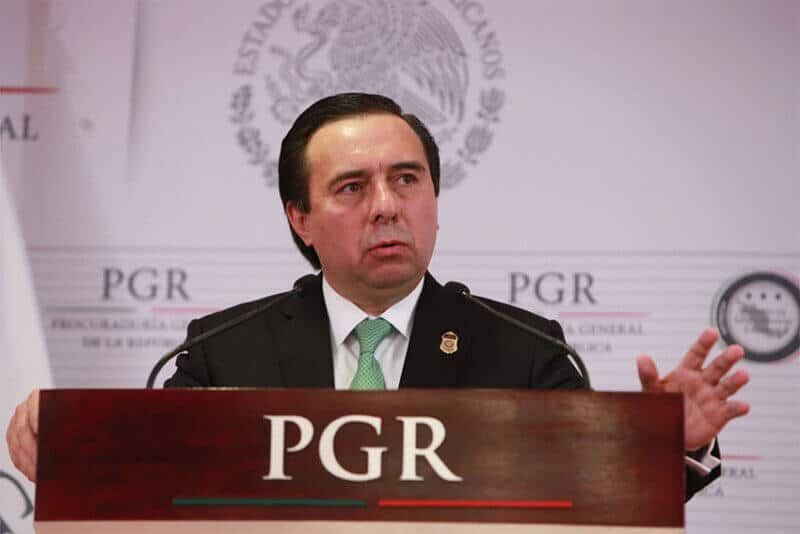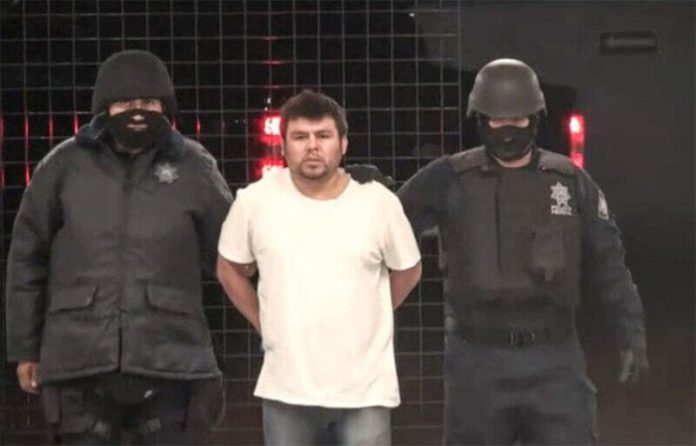A high-ranking federal security official offered a suspect in the case of the 43 students who disappeared in Guerrero seven years ago 4 million pesos to give false testimony to support the previous federal government’s so-called “historical truth,” the latter claims.
Felipe Rodríguez Salgado, an alleged leader of the Guerreros Unidos crime gang who was acquitted of involvement in the Ayotziniapa case in 2018, told journalist Anabel Hernánedez that Tomás Zerón, former head of the now-defunct Criminal Investigation Agency (AIC), visited him in the Altiplano federal prison to try to bribe him.
He spoke to Hernández, a well known investigative reporter who writes about drug trafficking and organized crime, in January 2019 but the contents of the telephone interview weren’t published until Thursday.
Rodríguez, also known as “El Cepillo,” said Zerón visited him twice in February 2015. During the first visit, the then AIC chief – who the government is trying to have extradited from Israel to face torture and tampering with evidence charges – offered him 4 million pesos (US $194,000 at today’s exchange rate) to incriminate former Iguala mayor José Luis Abarca and three other Guerreros Unidos leaders: Mario Casarrubias Salgado, Sidronio Casarrubias Salgado and Gildardo López Astudillo.
According to the previous government’s official version of events – the so-called historical truth – Abarca, who remains in prison awaiting trial, colluded with Guerreros Unidos leaders to abduct, murder and incinerate the bodies of the Ayotzinapa students, who disappeared on September 26, 2014.

The previous government said the students, traveling on a bus they commandeered to go to a protest in Mexico City, were intercepted by corrupt municipal police who handed them over to members of the Guerreros Unidos who subsequently killed them, burned their bodies in a dump in the municipality of Cocula and disposed of their remains in a nearby river.
Rodríguez told Hernández that he rejected the offer from Zerón, who subsequently told him to think it over. He said the then security official offered to assist him with his legal process if he agreed to cooperate, telling him he would arrange lawyers for him.
“I told him no because I didn’t have anything to say because I had been tortured. Everything I … [confessed to] was part of that. So he said to me, ‘Think about it and I’ll come back in five days.’ And he left.”
Rodríguez is one of scores of Ayotzinapa suspects who were released from prison after it was determined they were tortured, including in the presence of Zerón.
The judge who freed him after almost four years’ imprisonment ruled that without the confessions obtained through torture, authorities had insufficient evidence to prove he was a Guerreros Unidos leader and involved in the students’ disappearance.
The former suspect, who was 25 at the time the students disappeared, told Hernández that Zerón returned to the Altiplano prison eight days after the initial visit. He arrived at the México state prison by helicopter and was accompanied by an army officer and his mother. Zerón’s goal, Rodríguez said, was to get his mother to convince him to accept the 4-million-peso agreement.
But “El Cepillo” once again refused to cooperate. “… I said no because I had no reason to accuse people I don’t know,” he said.
Rodríguez said he told his mother not to pay any attention to people she doesn’t know. “Go home and stop doing this,” he said he told her.
In response to his refusal to cooperate, Rodríguez said Zerón warned him he would be killed if he spoke about the 4-million-peso offer. In his interview with Hernández, published Thursday in the newspaper Milenio, the former suspect denied any involvement in the students’ disappearance.
He said that Zerón, who along with former attorney general Jesús Murillo Karam is considered a key architect of the historical truth, was the only official who tried to persuade him to incriminate the former Iguala mayor and the alleged Guerreros Unidos leaders.
Rodríguez also said he met on one occasion with the lawyers for the missing students’ families, whom he told how sorry he was about what happened to the 43 young men. He said he also told them that he wanted the truth about what happened to come out so that his name would be definitively cleared.
Just over seven years after the students disappeared, no one has been convicted of the students’ disappearance and presumed murder and the current federal government has not divulged its own version of events despite launching a new investigation almost three years ago and rejecting its predecessor’s historical truth. The remains of just three students have been found and formally identified.
The federal Interior Ministry released a document last week that included a transcript of a text conversation between Gildardo López and a deputy chief of the Iguala municipal police that partially supports the previous government’s conclusion as it indicates that at least 38 students were handed over to the Guerreros Unidos by corrupt police.
The army has long been accused of involvement in the case but a document recently released by the federal Attorney General’s Office containing testimony from soldiers was so heavily redacted that it was illegible.
With reports from Milenio
